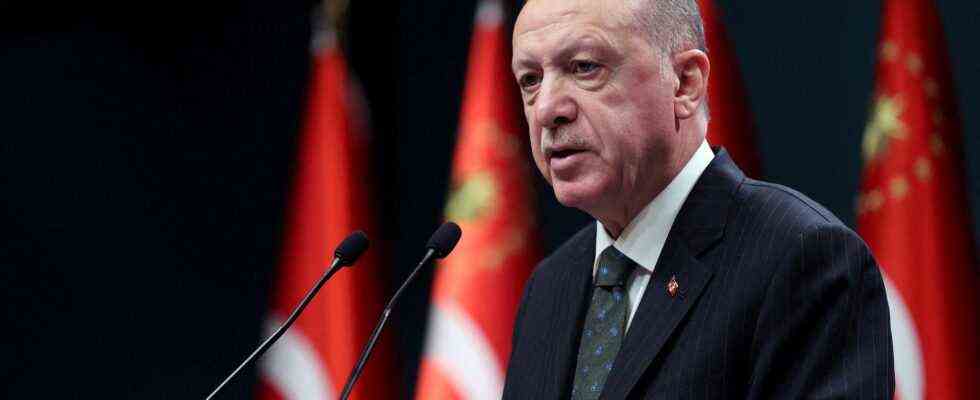analysis
As of: 23.12.2021 4:38 p.m.
Turkish President Erdogan is pursuing his policy of low interest rates with all his might – despite high inflation. As a result, the lira lost value for months. The recent stabilization steps could come at a high price.
Turkish President Recep Tayyip Erdogan has bought himself time. It is currently not foreseeable whether this will be sufficient until the election in June 2023. The hedge of lira deposits announced on Monday evening and interventions by the central bank through currency sales have significantly stabilized the Turkish currency. According to the Internet newspaper “Duvar”, the economist and former central bank employee Ugur Gürses assumes that the central bank supported the lira with around seven billion dollars. While more than 20 lira had to be paid for one euro on Monday, it is less than 13 today.
A video on the lira published earlier this week by the semi-public Halkbank shows how great the pressure was. An elderly gentleman walks through a Lira museum with a younger man and explains with a serious expression and an expert eye the advantages of the currency. Anatolian-like sounds run in the background. The message is clear. The Turkish currency lira is strong.
Loss of trust stopped for the time being
Professor Erdal Yalcin has Turkish roots. He researches and teaches economics at the Konstanz University of Applied Sciences and together with the “Kiel Institute for World Economy”. Yalcin says Erdogan did not invent deposit insurance against a foreign currency. A similar instrument was tried out in Turkey as early as the 1970s and was sharply criticized in retrospect.
With the measure taken on Monday, however, in a situation of maximum loss of confidence, the state managed to stop the lira from falling, at least temporarily, said Yalcin. However, taxpayers will have to answer for possible lira devaluations in the coming months. Infinite resources are not available, warns Yalcin. Above all, the instrument is not a means of containing inflation in the long term, and if Erdogan sticks to his dogma of lowering interest rates, the lira will soon come under pressure again.
Moving away from rate cuts unlikely
The next meeting of the central bank is in January and in Turkey many assume that the Turkish president will reduce the pressure on the central bank after the high volatility of the past few days. In principle, however, Erdogan seems to be a firm believer in a policy of lowering interest rates. He has proclaimed this again and again.
Observers say that the Islamic conservative Erdogan invokes the Koran, in which interest is described as a sin. Erdogan has voiced the bizarre idea of lowering the key interest rate to curb inflation so often that he would lose face if he changed his mind.
Yalcin is concerned that Erdogan’s real goal is not to stabilize Turkey economically, but only to maintain power. He wants to generate rapid growth before the next election. For this he is ready, so the momentary impression, to empty the state coffers and create an economic flash in the pan. The pile of broken glass after the election victory is secondary. Yalcin criticizes that all of this is taking place on the back of the nation. He knows people in Turkey who are already having problems satisfying their basic needs due to the high inflation.
Erdogan once led Turkey out of the crisis
It is tragic that Erdogan once steered Turkey out of the crisis in order to possibly lead it back into it now. In 2001 the country went through a severe economic downturn. After taking power, Erdogan achieved unprecedented prosperity through appropriate reforms. In the early 2000s, his party was considered close to business. Renowned economists advised the AKP. Erdogan and his environment were based on science and were successful. That time is past.
The lira may continue to score against the euro and the dollar for the next few days and weeks. But the inflation of the past few months has already pushed prices up significantly, especially for groceries and everyday products. The official price increase is 21 percent. Independent economists speak of well over 50 percent.
In order to stop inflation, the key rate must be raised without any ifs or buts. This is an anchor point in economics, according to Erdal Yalcin. Russian President Vladimir Putin was asked at his annual press conference today whether he would grant independence to the Russian central bank. Journalist Nataliya Vasilyeva tweeted his response: “If we don’t do that, we’ll end up like Turkey.”

